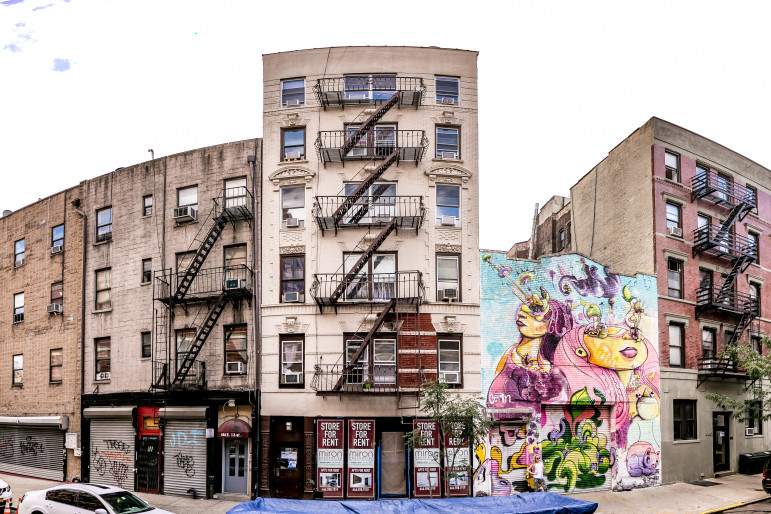After the state budget deal failed to include a proposal for an Albany-funded rental voucher system, advocates are setting their sights on getting the City Council to pass Intro 146, which would increase the value of rental vouchers under the CityFHEPS program to better reflect market-rate rents.

Adi Talwar
Buildings in the East Village.After the state budget deal failed to deliver the homelessness prevention funding that advocates had hoped for, they’re setting their sights on getting the City Council to pass legislation that would boost the value of rental vouchers offered under CityFHEPS, the city’s main rental subsidy program for low-income New Yorkers experiencing or at risk for homelessness.
Advocates are calling for the Council to pass Intro. 146, a bill sponsored by Councilman Stephen Levin that was initially introduced in 2018. The legislation would increase the maximum rent covered by a CityFHEPS voucher to the same rates offered by the federal Section 8 program—$1,945 for a one-bedroom or $2,217 for a two-bedroom apartment. CityFHEPS vouchers, by comparison, cover a maximum rent of just $1,265 for a single person or $2,040 for a family of five or six, what homeless people and advocates say is far too low in New York’s costly rental market, rendering the vouchers largely ineffective.
“We knowingly are giving individuals and families what really amounts to false hope,” Levin said during a virtual press conference Thursday in support of his bill, organized by Voices Of Community Activists & Leaders (VOCAL-NY). Only about 4 to 5 percent of CityFHEPS voucher holders actually succeed in securing an apartment each month, Levin added, and the average length of stay for a family in the city’s shelter system is 495 days. “One of the main reasons why that length of stay is so long is because the vouchers that we provide them don’t work.”
Vocal-NY and other advocates say the passage of Intro. 146 is more vital than ever this legislative session because of the how the pandemic has exacerbated the city’s housing crisis. They say they were disappointed in how homelessness was treated in this year’s state budget, finalized earlier this month. While Albany lawmakers included $2.4 billion for a statewide rent relief program, they did not include State Sen. Brian Kavanagh’s Housing Access Voucher Program (HAVP), which would have allocated $200 million to create a state-funded rental assistance voucher program similar to Section 8. The budget did earmark $100 million for a different rental supplement program that advocates have deemed less effective, since it allows local governments to opt-in to participation.
“We were upset and disrespected because of the fact that homeless people were left out of the budget,” advocate and homeless New Yorker Fannie Lou Diane said during Thursday’s press conference. “We need to do something. We are in dire times. I can’t express how important this is. We are in the worst housing crisis since the Great Depression.”
There were 49,825 people in the city’s shelter system as of April 22, city data shows, including nearly 16,000 children. Advocates say rental subsidy vouchers are one of the best tools the city has to help homeless residents move to permanent housing, and argue that doing so is cheaper than paying to house those residents in the shelter system (in fiscal year 2017, one report found, the city spent an average of $37,994 per adult and $73,162 per family in shelter costs). But the CityFHEPS program has been rife with problems, including the fact that landlords frequently refuse to rent to voucher-holders despite it being illegal under the city’s Human Rights law to reject renters based on source of income.
Natalie Piggee, an organizer with Neighbors Together, spoke during Thursday’s rally about her own experience with the CityFHEPS program since she unexpectedly became homeless during October of 2020 and received her voucher in January, but has been unable to find a suitable apartment for herself and her three children that would be covered by the voucher amount of $1,580 a month.
“We started to understand when looking for housing that this voucher is not dependable at all,” she said. “My son has been homeless basically his entire life and he’s going to turn one homeless because this voucher doesn’t work. There is no place that I have found adequate that will take a voucher.”
Advocates say the low value of CityFHEPS vouchers forces participants to accept subpar apartments, including those riddled with rodents and mold, or to rent a single room in an apartment with strangers.
“More often than not, when our clients are able to find rentals at the CityFHEPS rate, it is just a room, which does not offer the same sense of stability as an apartment,” Bernadette Reed, an employee of the social service nonprofit Urban Pathways, said at Thursday’s virtual rally.
Intro. 146 has the support of 39 councilmembers so far, enough to override a potential mayoral veto. A rep for City Council Speaker Corey Johnson, who has the power to bring the bill up for a vote on the Council floor, expressed support for the legislation in a statement to City Limits on Monday.
“The Speaker has been working with Council Member Levin to move this bill through the legislative process. We are a city in the midst of a major homelessness crisis, and must do everything we can to address this issue, including passing introduction number 146,” Council Spokesperson Jennifer Fermino said.
This article is part of a series supported by the Family Homelessness Coalition. City Limits is solely responsible for the content.










One thought on “Shafted in State Budget, Homeless Advocates Push City to Increase Value of Rental Vouchers”
I am currently in the shelter system I am 55yrs of age of with numerous health issues I pray for a place of my own everyday all day, 3years homeless it’s been rough I need help or desperately doors close in my face with this $1,265 voucher .